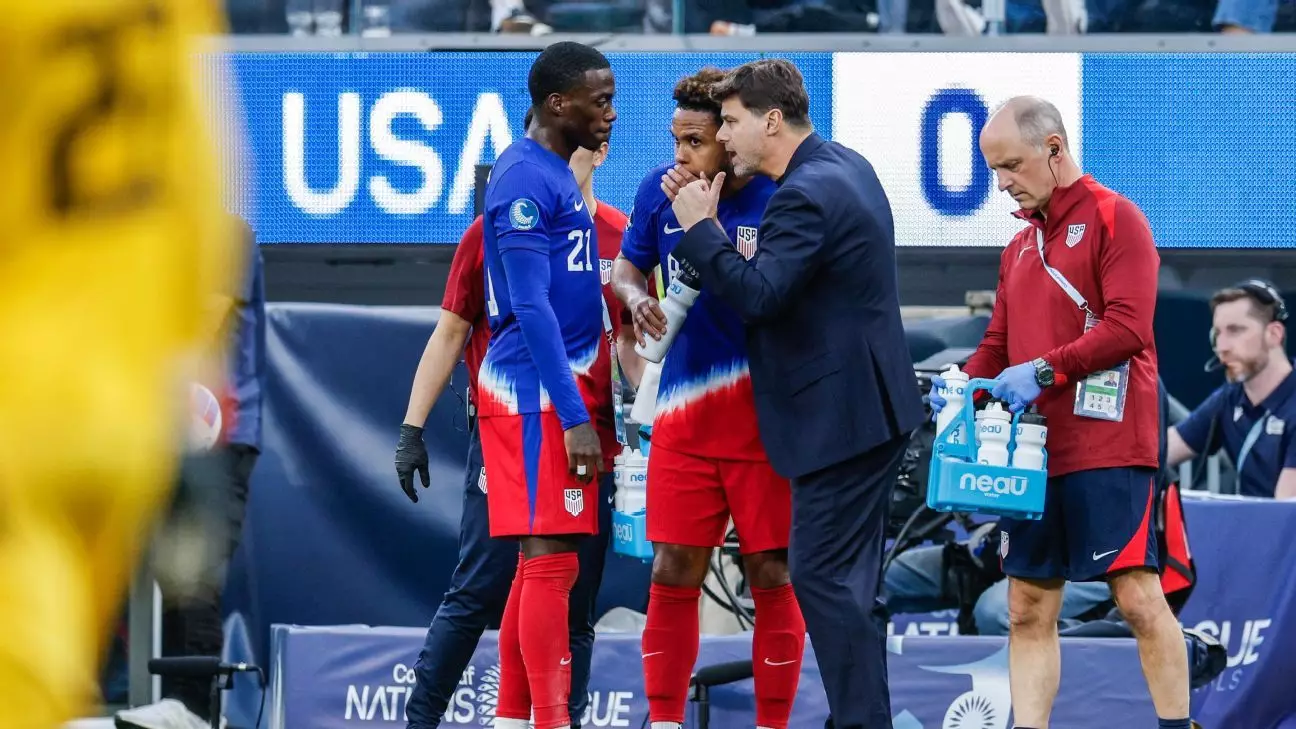In the realm of international soccer, the weight of a national jersey carries with it the expectations of glory; yet, for the U.S. men’s national team, the recent semifinal exit from the Concacaf Nations League against Panama served as a sobering reminder that wearing the crest is not synonymous with winning. After enduring a disheartening 1-0 loss at SoFi Stadium, manager Mauricio Pochettino expressed palpable frustration, emphasizing that the feeling of entitlement must be stripped away if the team dreams of success on the grand stage. His words are not mere grievances but resonate as a critical reflection of a deeper cultural issue within American soccer.
Possession Without Penetration
Possession statistics might suggest dominance, yet they can be misleading, especially when juxtaposed with the actual goal-scoring opportunities generated. The U.S. wielded an impressive 66% possession, yet their expected goals (xG) of merely 0.68 underscores a grim realization: possession without incisive action is fruitless. While Panama’s xG was a dismal 0.10, they seized a moment—an invaluable lesson in the art of making the most of limited chances. It’s a stark reminder that in soccer, the scoreboard is the ultimate arbiter; dominating possession does not guarantee victory.
Pochettino’s headaches intensified as substitute Cecilio Waterman netted the decisive blow in the dying minutes of the second half. This poignant moment encapsulated the stark disparity between desire and execution. The U.S. players were left to ponder how so much possession could lead to such little reward, a fate echoed by their previous defeats at the hands of Panama. It raises a pressing question about the psychological readiness of the U.S. squad to tackle high-stakes matches and assert their competitive edge.
A Lament for Aggressiveness
Pochettino’s disenchantment with the team’s initial approach was palpable. In his after-match remarks, he chastised the players for their lack of urgency and aggression. The early stages of the match were characterized by a complacency that bordered on arrogance—the players seemed too comfortable, failing to engage with the kind of fervor that a national team game demands. This analysis reveals a haunting reality: American players may need a cultural shift, addressing issues that extend beyond pure skill and technique. The mentality of a fierce competitor must be ingrained if they aim to break free from this cycle of mediocrity against teams like Panama.
The second half hinted at potential transformation. Timothy Weah displayed flair and aggression, progressively driving the U.S. forward, while Patrick Agyemang came agonizingly close to scoring what would have been a much-needed goal. However, opportunities squandered in the heat of the battle reveal an unsettling trend: when the stakes are high, American players often falter in critical moments. Pochettino’s struggle to inject creativity into the game with players like Giovanni Reyna or Diego Luna only adds layers to the narrative—did he underestimate the need for innovation in crucial match scenarios?
What Lies Ahead?
As the team gears up for a third-place clash against Canada, a pivotal choice awaits Pochettino. Will he instill the importance of risk-taking and offensive execution among his players? Their performance against Panama demands a reevaluation of strategies and personal mindsets. Pochettino’s call for more aggression is not simply a matter of preferable playing style—it’s a clarion call for a transformation in the culture of U.S. soccer. The national team must shed the weight of complacency and embrace a collective scrappiness.
This loss, while painful, could serve as a precipitous moment for the U.S. Men’s National Team, compelling them to confront their shortcomings head-on. The question remains: will the players rise to the occasion, harnessing the disappointment as a catalyst for growth, or will they continue to allow similar narratives to define their legacy? As Pochettino and the team prepare for the next battle, the urgency for change has never been more critical.


Leave a Reply